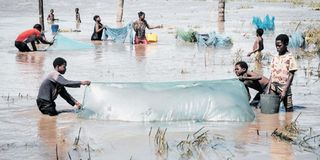Cyclone survivors now face threat of disease outbreaks

People use nets to fish in a flooded area hit by Cyclone Idai near Tica, Mozambique, on Sunday. The cyclone unleashed hurricane-force wind and rain that killed 705 people In Mozambique and Zimbabwe. PHOTO | AFP
What you need to know:
The UN Office for the Coordination of Humanitarian Affairs’ deputy head Sebastian Rhodes Stampa warned that disease outbreaks in inaccessible areas could be “really problematic”
Beira. Disease is threatening to aggravate the already dire conditions facing millions of survivors following the powerful tropical cyclone which ravaged southern Africa 10 days ago, officials warned on Sunday.
Cyclone Idai smashed into Mozambique’s coast unleashing hurricane-force wind and rain that flooded swathes of the poor country before battering eastern Zimbabwe -- killing 705 people across the two nations.
Amid the ongoing crisis, Zimbabwean television ZBC on Sunday reported that a young woman had given birth while sheltering from the floods in a tree.
Speaking at a briefing in Beira, 1,000 kilometres (620 miles) northeast of the Mozambique capital Maputo, Lands Minister Celso Correia said it was now “inevitable that cases of cholera and malaria will arise”.
The UN Office for the Coordination of Humanitarian Affairs’ deputy head Sebastian Rhodes Stampa, also at the briefing, warned that disease outbreaks in inaccessible areas could be “really problematic”.
The World Food Programme said Friday that the humanitarian disaster unfolding in Mozambique was on a par with the situation in Yemen and Syria which are both in the grip of civil wars.
Aid workers from across the world are continuing to arrive in the region to bring help to hundreds of thousands of affected people across an area of roughly 3,000 square kilometres (around 1,160 square miles). Survivors are struggling in desperate conditions with some still trapped on rooftops and those rescued in urgent need of food and medical supplies.
“The government is already setting up a cholera treatment centre to mitigate cholera. We should not be frightened when cholera issues arise,” added Correia, describing efforts to control the emerging humanitarian crisis.
“It is normal. It’s almost inevitable. Malaria, we know how it arises. We have lots of wetlands and we’re going to have malaria that is sure to come up (there).”
Wilfried Deliviai, a 19-year-old resident of Beira which was caught in the eye of the storm, said he felt “sorry for our town, our city, because we suffered a lot to build it”.
“Houses are completely destroyed, and some people don’t have money to rebuild their businesses -- and many businesses are going to fail,” he told AFP. (AFP)




